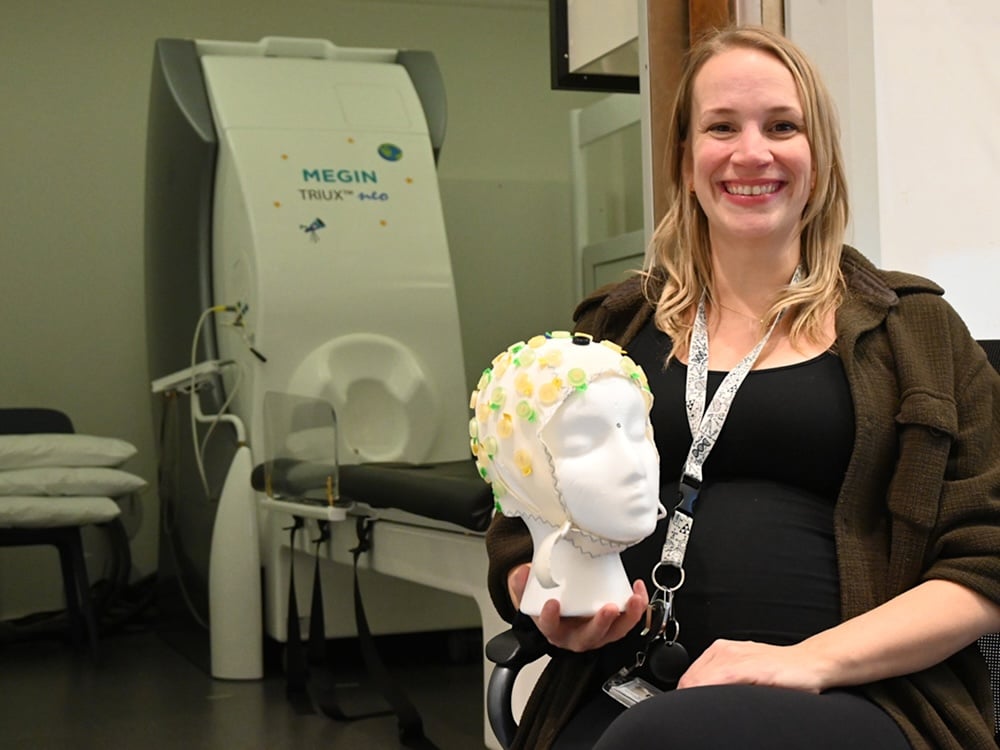Science
SFU Launches Innovative Mind-Mapping Machine for Epilepsy Care

Simon Fraser University (SFU) has initiated a groundbreaking study utilizing a new mind-mapping machine designed to assist patients suffering from epilepsy. The innovative device, known as Magnetoencephalography (MEG), captures non-invasive readings of electromagnetic fields generated by brain activity while patients are in a state of rest.
The MEG technology aims to provide healthcare professionals with enhanced insights into brain function, particularly in those diagnosed with epilepsy. This condition affects millions worldwide, often leading to unpredictable seizures and significant lifestyle challenges. By using this advanced machine, researchers hope to improve diagnostic accuracy and tailor treatment plans for individual patients.
Understanding the Technology
The MEG operates by detecting subtle magnetic fields produced by neuronal activity in the brain. According to the SFU research team, the patient simply needs to take a nap while the device collects data. This non-invasive approach minimizes discomfort and anxiety for patients, making it an appealing option for both adults and children alike.
The project is part of a larger initiative to explore innovative methods for monitoring brain health and understanding neurological disorders. Researchers at SFU are collaborating with various experts in the field to validate the effectiveness of the MEG technology. This collaboration is expected to yield significant findings that could influence future practices in epilepsy care.
Implications for Epilepsy Treatment
The introduction of the MEG machine marks a notable advancement in the way healthcare professionals can approach epilepsy management. Current methods often involve invasive procedures, such as biopsies or surgical interventions, to obtain critical information about brain function. The MEG offers a safer alternative, potentially increasing patient compliance and leading to more comprehensive data collection.
Early results from initial trials, conducted in 2023, indicate promising outcomes regarding the device’s accuracy and reliability in identifying abnormal brain activity associated with seizures. As the research progresses, scientists hope to establish standardized protocols for using MEG in clinical settings, thereby enhancing the overall treatment landscape for epilepsy.
With epilepsy affecting approximately 50 million people globally, advancements like the MEG technology are crucial. The potential to improve the quality of life for those living with this condition is significant, offering hope for more effective management strategies and better seizure control.
SFU’s commitment to pioneering research in neuroscience demonstrates the institution’s dedication to addressing pressing health challenges. As the study unfolds, it promises to not only impact the lives of individuals with epilepsy but also contribute to the broader understanding of brain health and neurological disorders.
This innovative approach holds the potential to reshape how healthcare providers diagnose and treat epilepsy, paving the way for future research and development in the field. The MEG machine could soon become a vital tool in the arsenal against neurological disorders, bridging the gap between advanced technology and patient care.
-

 Education3 months ago
Education3 months agoBrandon University’s Failed $5 Million Project Sparks Oversight Review
-

 Science4 months ago
Science4 months agoMicrosoft Confirms U.S. Law Overrules Canadian Data Sovereignty
-

 Lifestyle3 months ago
Lifestyle3 months agoWinnipeg Celebrates Culinary Creativity During Le Burger Week 2025
-

 Health4 months ago
Health4 months agoMontreal’s Groupe Marcelle Leads Canadian Cosmetic Industry Growth
-

 Technology3 months ago
Technology3 months agoDragon Ball: Sparking! Zero Launching on Switch and Switch 2 This November
-

 Science4 months ago
Science4 months agoTech Innovator Amandipp Singh Transforms Hiring for Disabled
-

 Education3 months ago
Education3 months agoRed River College Launches New Programs to Address Industry Needs
-

 Technology4 months ago
Technology4 months agoGoogle Pixel 10 Pro Fold Specs Unveiled Ahead of Launch
-

 Business3 months ago
Business3 months agoRocket Lab Reports Strong Q2 2025 Revenue Growth and Future Plans
-

 Technology2 months ago
Technology2 months agoDiscord Faces Serious Security Breach Affecting Millions
-

 Education3 months ago
Education3 months agoAlberta Teachers’ Strike: Potential Impacts on Students and Families
-

 Science3 months ago
Science3 months agoChina’s Wukong Spacesuit Sets New Standard for AI in Space
-

 Education3 months ago
Education3 months agoNew SĆIȺNEW̱ SṮEȽIṮḴEȽ Elementary Opens in Langford for 2025/2026 Year
-

 Technology4 months ago
Technology4 months agoWorld of Warcraft Players Buzz Over 19-Quest Bee Challenge
-

 Business4 months ago
Business4 months agoNew Estimates Reveal ChatGPT-5 Energy Use Could Soar
-

 Business3 months ago
Business3 months agoDawson City Residents Rally Around Buy Canadian Movement
-

 Technology2 months ago
Technology2 months agoHuawei MatePad 12X Redefines Tablet Experience for Professionals
-

 Business3 months ago
Business3 months agoBNA Brewing to Open New Bowling Alley in Downtown Penticton
-

 Technology4 months ago
Technology4 months agoFuture Entertainment Launches DDoD with Gameplay Trailer Showcase
-

 Technology4 months ago
Technology4 months agoGlobal Launch of Ragnarok M: Classic Set for September 3, 2025
-

 Technology4 months ago
Technology4 months agoInnovative 140W GaN Travel Adapter Combines Power and Convenience
-

 Science4 months ago
Science4 months agoXi Labs Innovates with New AI Operating System Set for 2025 Launch
-

 Top Stories2 months ago
Top Stories2 months agoBlue Jays Shift José Berríos to Bullpen Ahead of Playoffs
-

 Technology4 months ago
Technology4 months agoNew IDR01 Smart Ring Offers Advanced Sports Tracking for $169










